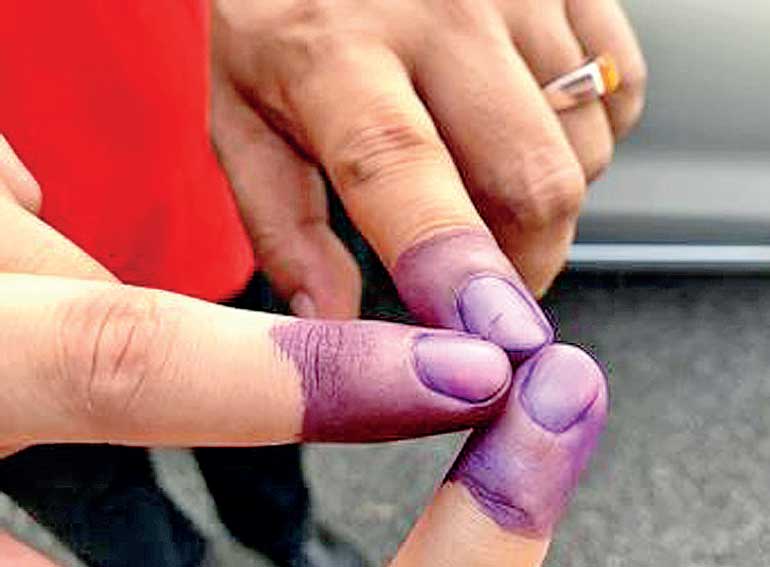Monday Feb 16, 2026
Monday Feb 16, 2026
Friday, 17 January 2025 00:30 - - {{hitsCtrl.values.hits}}

The new Government’s constitutional reform including removing the Executive Presidency is a welcome step. Voting rights for expatriates should be enshrined as a basic fundamental right
 Context
Context
Last year Sri Lankans participated in both Presidential Elections and Parliamentary Elections. In 2025, the country is likely to face two more elections: Local Government and Provincial Government elections. However, a significant portion of the Sri Lankan population residing overseas – working hard to provide food and a better living condition for their families and loved ones back home, continues to be denied their voting franchise. Does anybody care about them? This is a million dollar question the new Government and relevant authorities must answer.
Attempts at reform
Efforts to grant voting rights through various committees, rights groups, NGOs and political activism. The author has previously written on this subject in FT. (See Expats’ right to vote | Daily FT). However, without amendments to the election law, the Election Commission remains unable to further progress.
The Election Commission deserves credit for reminding the then-incumbent president regarding this matter during a press conference following the conclusion of Presidential Elections. (Watch https://www.youtube.com/watch?v=MQ1xw7DIRTA from 2:07:00 to 2:09:00).
Anura Kumara Dissanayaka’s acknowledgement of the Election Commission’s request by way of his signature smile is a stark reminder of why such reforms are urgently necessary before any future elections are scheduled. His Government has more than the adequate majority in Parliament to enact all required reform.
Relationship between JVP/NPP and expatriates
Minister Sunil Handunnetti during his visit to KSA (in 2017) told Arab News that the expatriates should be given voting rights. On another occasion he urged the then Government to provide a pension plan and voting right for all Sri Lankan foreign workers. He also spearheaded to collect signatures of Sri Lankan expatriates from Middle Eastern countries such as Qatar, Kuwait, Oman and Saudi Arabia, which were submitted as petitions.
JVP/NPP traditionally enjoys strong support amongst expatriates. Many expatriates have financially supported NPP’s election campaigns and some have even travelled to Sri Lanka for casting their vote. In fact, there was criticism from one of the ex-ministers of expats’ undue influences in the election process which the author has denounced. (See Expats’ voting rights: Why Dr. Rajitha Senaratne is wrong | Daily FT)
However and despite the perceived support for expatriates, NPP Government has thus far failed to introduce any significant legal reforms or consultations to address the voting and other rights of this demographic. The silence of NPP (and in particular ministers like Sunil Handunetti), is both hypocritical and mirrors the lethargic approach of previous Governments!
Elections and constitutional reform
The new Government has reportedly undertaken a major project to draft a new constitution which includes removing the Executive Presidency. This is a welcome step, and the author proposes that voting rights of expatriates (at their respective overseas locations) be enshrined as a fundamental rights. Additionally, all necessary legal framework and amendments to facilitate expat voting must be enacted without further delays.
Electronic Voting Machines (EVMs) and Indian assistance
India, the world’s largest democracy, successfully employs EVMs for all its elections. Implementing of EVMs in Sri Lanka should be a straightforward task. Given the strong ties between the Sri Lankan and Indian Governments, seeking India’s technical and financial assistance to deploy EVMs would not be out of place. Sri Lankan Election/IT experts could ensure the integrity and transparency of the new system making expatriates voting even more feasible.
Passport renewal challenges
Due to shortage of the passports, Sri Lanka now requires online appointments for renewals/replacement passports. However, the system mandates submission of an electronic photo through authorised studios, which are not available outside Sri Lanka. This creates a significant obstacle for expatriates who need urgent or one-day passport services. While embassy applications are an alternative, they are time-consuming and cumbersome. The waiting time for online appointment is another disappointment the expats are facing with. In some cases, expatriates facing delays in renewing their passports risk losing employment or missing critical travel opportunities.
Conversion of driving licenses
The Motor Traffic Department previously allowed conversion of overseas driving licenses to Sri Lankan licenses, but this practice has reportedly ceased. Obtaining an overseas license often involves substantial costs, sometimes running into thousands of dollars. It is unfair to deny expatriates to convert their licenses upon returning to Sri Lanka. The new Government and traffic authorities should re-visit and restore this service.
Access and cost of higher education
Expatriates appreciate the University Grant Commission (UGC) for allocating a quota for overseas-educated children to enter Sri Lankan Government universities under a self-paying scheme. However, the cost is prohibitive for many middle-income generating expats. For instance, an MBBS degree will cost $ 12,500 per year for five years – a substantial financial burden. With increasing redundancies and job losses among expatriates in selected countries, many families find it challenging to sustain such payments.
The UGC/Government should think of alternative proposals. This may include conducting Sri Lankan public exams (GCE (O/L) and GCE (A/L) in overseas locations, similar to how Indian exams are conducted in Middle Eastern countries. Another alternative is to provide fee exemption/relaxation for deserving families on a case-by-case basis
Way forward
The author acknowledges that most of the challenges highlighted above are a result of actions or rather inactions of previous Governments. However, this cannot excuse further delays in addressing these pressing issues. The author remains optimistic (and requests) that the new Government will take swift actions to resolve these challenges, meeting the high expectations of both the expatriate and common Sri Lankan population.
(The writer is a migrant worker for the last three decades and advocates for expat rights. The opinions are his personal unless quoted with references. He can be contacted through email: [email protected].)